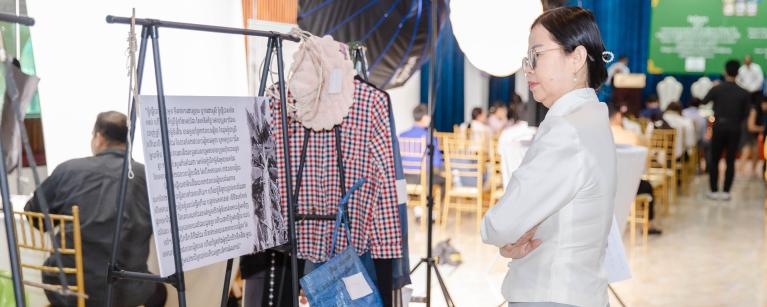The book “White Tears” shares the true stories of women from small-scale rubber plantations, banana farms, and conservation communities. The title symbolizes the latex or “white” substance that covers the ground in these plantations and represents the women’s daily efforts to achieve results for their superiors. “Tears” signifies the sweat, hard work, and difficulties they face in their daily lives.
SILAKA, a partner organization of Oxfam, used the “Feminist Economic Justice Agenda” tool to study these stories, focusing on gender inequality, equal opportunities, violence against women and girls, and ending impunity. The study followed a six-step process that involved understanding the women’s situation, collecting their stories, and developing a joint advocacy plan.
During this process, the women’s groups actively engaged in discussions, consultations, and validations, collectively deciding how to present their stories. Everyday items from their lives were collected and exhibited, providing a tangible representation of their stories. By doing so, participants, especially policy makers, gained a deeper understanding of their situations, challenges, concerns, and needs.
On December 19, 2023, SILAKA and the three women’s groups collaborated to organize a national policy dialogue titled “National Policy in Response to the Needs and Concerns of Women in Trade Value Chains of Rubber and Banana.” The dialogue addressed the concerns and needs of women in the banana and rubber production value chain. The event had 77 participants, with 69% being women. Attendees included representatives from government bodies such as the Ministry of Labor and Vocational Training, Ministry of Environment, Ministry of Women’s Affairs, General Directorate of Rubber, and Agricultural and Rural Development Bank. Representatives from national and international civil society organizations, women in small-scale rubber plantations, women from the Natural Resources for Forest and Wildlife Conservation Community, and a youth group also participated.
The policy dialogue resulted in significant outcomes and provided a way forward for SILAKA and the women’s groups to continue their pursuit of economic justice. Representatives from the mentioned ministries and state institutions expressed their willingness to address the challenges, concerns, and needs raised by the women’s groups. The key points highlighted during the dialogue were:
1. Lack of access to the National Social Security Fund (NSSF) services for workers in banana and rubber plantations, which goes against the agreement between the companies and the Royal Government of Cambodia.
2. Gender-based wage disparity, with female workers earning less than male workers and experiencing discriminatory practices such as male workers leaving their posts earlier.
3. Irresponsible handling of chemical waste by companies, leading to water pollution, poisoning of animals, and adverse effects on the health of people and wildlife dependent on the river.
4. Small-scale rubber plantation families facing debt due to loans taken for investing in rubber plantations and production. Lack of standardized pricing for rubber compounds further compounds their challenges. By forming a community, these families gain collective bargaining power to negotiate prices with middlemen.
In response to the concerns and needs raised by the women’s groups, representatives from state ministries and institutions provided information on relevant laws, policies, and mechanisms that enable women in each community to seek consultation and report their issues. Further planning was undertaken to ensure a response to these concerns and needs, resulting in a report outlining the next steps to be taken with policy makers.
Here is an experience of a woman documented in the book “White Tears.“ For their safety and security, we keep the source anonymous.
“I can do various type of work, regardless of whether they are traditionally considered male or female roles. However, I have noticed that men are paid more than women, particularly for jobs like spraying or truck driving. While I am also capable of driving a truck, I only earn 28,000 riel per day, whereas men earn 35,000 riel. This wage disparity persists even though we perform the same work and achieve the same results for the company. Typically, women earn nearly ten thousand riel less than men.
Currently, the price of latex harvested from rubber tree is decreasing. Moreover, the price of coagulated latex is extremely low compared to the quantity of rubber produced through the block rubber process.
I don’t want to sell the block rubber that has gone through the technically specified rubbers (TSRs) process. The chemical used in this process pose health risks, causing flu-like symptoms and hand irritation. Furthermore, companies located near the conservation community use herbicides and pesticides, which contribute to water pollution in the nearby river.
Without proper waste management and disposal, the chemical waste from herbicide or banana trees end up in the Srepok River, contaminating the water. The river’s ecosystem suffers, leading to the death of aquatic life. This contamination significantly affects wildlife and communities that rely on the river for their daily needs.”
Text by: Sreynich Khat & Chan Sreyleak Pov / SILAKA
